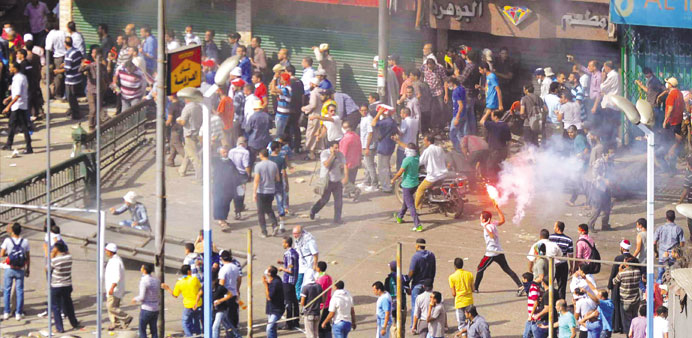Supporters of Mohamed Mursi during a protest called by the Muslim Brotherhood in Ramses Square in Cairo yesterday.
Reuters/Cairo
Islamist protests descended into yet another bloodbath across Egypt yesterday, with around 50 killed in Cairo alone on a “Day of Rage” called by followers of ousted President Mohamed Mursi to denounce a crackdown by the army-backed government.
As automatic gunfire echoed across Cairo, the standoff appeared to be sliding ever faster towards armed confrontation, evoking past conflict between Islamists and the state in the Arab world’s most populous nation.
While Western governments urged restraint after hundreds died when security forces cleared protest camps two days ago, Saudi Arabia’s King Abdullah endorsed the government’s tactics, saying yesterday his nation stood with Egypt in its battle against “terrorism”.
Army helicopters hovered low over supporters of Mursi’s Brotherhood in Ramses Square, the theatre of much of yesterday’s bloodshed in Cairo, black smoke billowing from at least one huge blaze which lit up the night sky after sundown.
A Reuters witness saw the bodies of 27 people, apparently hit by gunfire and birdshot, wrapped in white sheets in a mosque. A Reuters photographer said security forces opened fire from numerous directions when a police station was attacked.
Men armed with automatic weapons appeared to be taking part in the Cairo protests. At Ramses Square, Reuters journalists saw three men carrying guns; protesters cheered when cars carrying gunmen arrived, another Reuters witness said.
“Sooner or later I will die. Better to die for my rights than in my bed. Guns don’t scare us anymore,” said Sara Ahmed, 28, a business manager who joined the demonstrators in Cairo. “It’s not about the Brotherhood, it’s about human rights.”
More than 30 people died in clashes elsewhere in Egypt. A security official said 24 policemen had been killed and 15 police stations attacked since late Thursday, underlining the increasing ferocity of the violence.
Egyptian state media has hardened its rhetoric against the Brotherhood - which ruled Egypt for a year until the army removed Mursi on July 3 - invoking language used to describe militant groups such as Al Qaeda and suggesting there is little hope of a political resolution to the crisis.
“Egypt fighting terrorism,” said a logo on state television.
Showing no sign of wanting to back down, the Muslim Brotherhood announced a further week of nationwide protests.
The army deployed armoured vehicles on major roads around the capital and the interior ministry said police would use live ammunition against anyone threatening public buildings.
Anger on the streets was directed at army commander General Abdel Fattah al-Sisi, who moved against Mursi last month after massive street rallies against his administration.
The Brotherhood said in a statement: “The coup makers have lost all lost their minds, norms and principles today.”
Emergency services said eight protesters were killed in clashes in the Mediterranean town of Damietta, five in Fayoum south of Cairo, four in the Suez Canal city of Ismailia and four in the Nile delta town of Tanta. Eight people were killed in Alexandria, Egypt’s second city, and four in Port Said.
A police conscript was shot dead in the north of Cairo, state news agency Mena reported. Nile TV showed video of a gunman among Islamist protesters firing from a city bridge.
Travel firms cancel holidays
Violence sweeping Egypt has hit its tourism - a vital part of the economy - as governments warn holidaymakers to stay away, prompting some foreign travel agents to stop all trips there. The latest unrest looks likely to kill off a tentative recovery of a sector that accounted for more than a tenth of GDP before the uprising that ousted president Hosni Mubarak in 2011, starting a period of political uncertainty which worsened with events of this week.

